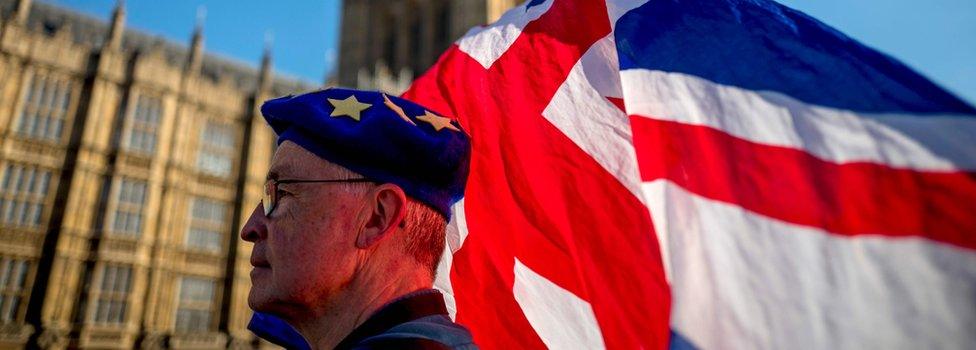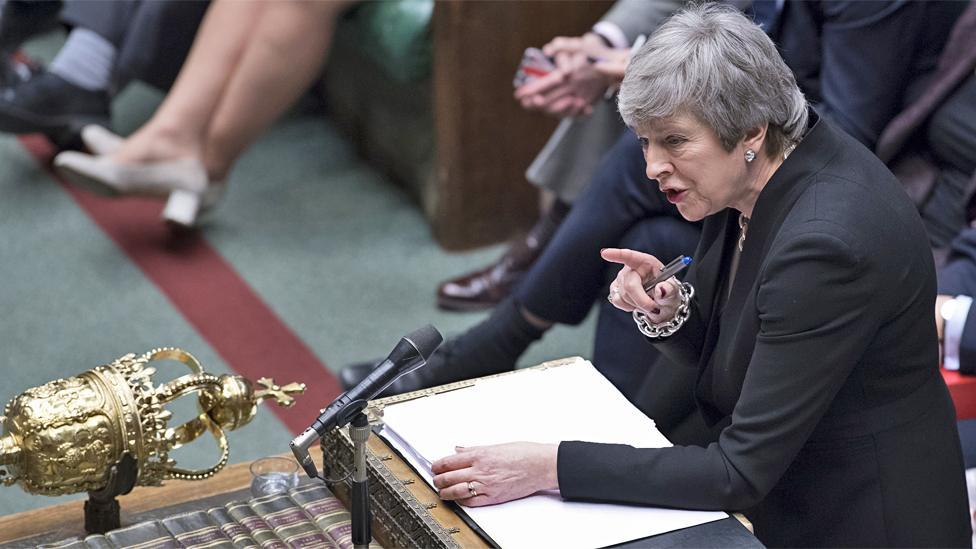Brexit: Theresa May 'focused' on leaving on time, despite calls for delay
- Published
- comments
Theresa May says all her energy is focused on leaving with a deal on 29 March
Theresa May says she remains "focused" on leaving the EU on 29 March, despite calls from her own party for a delay.
The PM said she had felt a "real determination" from EU leaders in recent days to find a "smooth and orderly way [to leave] with a deal".
But Dutch PM Mark Rutte warned her the UK was "sleepwalking into a no-deal scenario" and needed to "wake up".
Mrs May admitted there was "still more to do" before Parliament could vote on her final plan.
The UK will leave the EU on 29 March, whether it has agreed a deal or not.
The only way to change that is to revoke Article 50, or to request a delay from the EU - which the bloc would have to approve.
Some Conservative colleagues have suggested she should consider delaying Brexit to avoid leaving without a deal.
The BBC's political editor Laura Kuenssberg understands No 10 is considering ways to give "more assurances" to MPs and ministers concerned about leaving the EU without a deal.
But at a press conference in Sharm-el-Sheikh, the prime minister was defiant about pushing forward with the scheduled date.
"A delay in this process doesn't deliver a decision in Parliament [and] it doesn't deliver a deal," she said.
"What it does is precisely what the word delay says, it just delays the point in which we come to that decision."

Talk of delay, but no conclusions

What is Theresa May really willing to do if her deal falls in Parliament?
Increasing numbers of EU leaders and her own government ministers believe that she should acknowledge that she might have to delay the UK's departure from the EU if her agreement is rejected by MPs again next month.
The President of the EU Council, Donald Tusk, says it's "rational" to consider.
Extending the process was discussed by Theresa May and Angela Merkel over breakfast this morning - but not with any conclusion.
And the prime minister, herself, will do almost anything to avoid answering the question.

On Sunday, the prime minister told MPs they would get their chance to have a final "meaningful vote" on her deal by 12 March - only 17 days ahead of Brexit - causing criticism from opposition MPs, fellow Tories and business leaders.
But MPs will get to put forward their own proposals on Wednesday, when the government tables an amendable motion on which they can vote.
Mrs May has been at the EU-League of Arab States summit in Egypt for two days and held a number of meetings with EU leaders on the fringes as she presses for more concessions to her deal.
The major sticking point is the backstop - the policy to prevent a hard border returning to the island of Ireland.
Parliament voted for her to return to Brussels to seek "alternative arrangements" to replace it, as critics feared it would keep the UK locked into EU rules indefinitely.
Her team has been discussing proposals with EU officials, including introducing a time limit to the policy or creating a get-out clause for the UK.

But the EU has repeatedly refused to reopen the withdrawal agreement - the so-called "divorce bill" element of the deal that includes the backstop.
Mrs May said: "There is still more work to do, and my team will be in Brussels [on Tuesday] working on the legally binding assurances that the UK Parliament needs in relation to the backstop.
"But what I have sensed in all of my conversations with my fellow leaders, both here in Sharm-el-Sheikh and in recent days, is a real determination to find a way through which allows the UK to leave the EU in a smooth and orderly way with a deal."
Germany's Angela Merkel described her meeting with Mrs May as "good" and "friendly", while European Commission President Jean-Claude Juncker said his talks with the PM had been "constructive".
However, Irish Taoiseach Leo Varadkar described a no-deal Brexit as a "lose-lose-lose scenario for everyone", although he told reporters ahead of a meeting with Mrs May that he thought the outcome was unlikely.
And Mr Rutte told the BBC: "It's four weeks until the end date and still the UK has not agreed a position. So now we are sleepwalking into a no-deal scenario.
"It's unacceptable and your best friends have to warn you. Wake up. This is real. Come to a conclusion and close the deal."
Rutte: 'Wake up and close the Brexit deal'
President of the European Council, Donald Tusk, said it was "absolutely clear" to him that there was no majority in the House of Commons to approve any deal, adding: "We will face an alternative, chaotic Brexit or an extension."
He said he discussed a "potential extension" to Article 50 with Mrs May, saying it was an "objective fact" that became more likely as 29 March approached, and would be a "rational solution".
But he said that Mrs May told him "she still believes she is able to avoid this scenario".
The prime minister has long resisted any suggestion that the UK's departure could be postponed beyond 29 March.
But BBC political editor Laura Kuenssberg says two cabinet ministers have told the BBC they believe she will this week grant some kind of concession to allow for a possible delay.

Key dates for Brexit this week

Monday: The PM meets with EU leaders, including Mrs Merkel and Mr Junker, on the fringes of the EU-League of Arab States summit.
Tuesday: Mrs May gives a statement to the House of Commons updating them on her progress on Brexit. Members of her negotiating team will return to Brussels to continue talks with the EU.
Wednesday: MPs debate an amendable motion tabled by the government. Speaker John Bercow chooses which amendments to put forward, and MPs vote on the next step proposals.


- Published22 February 2019

